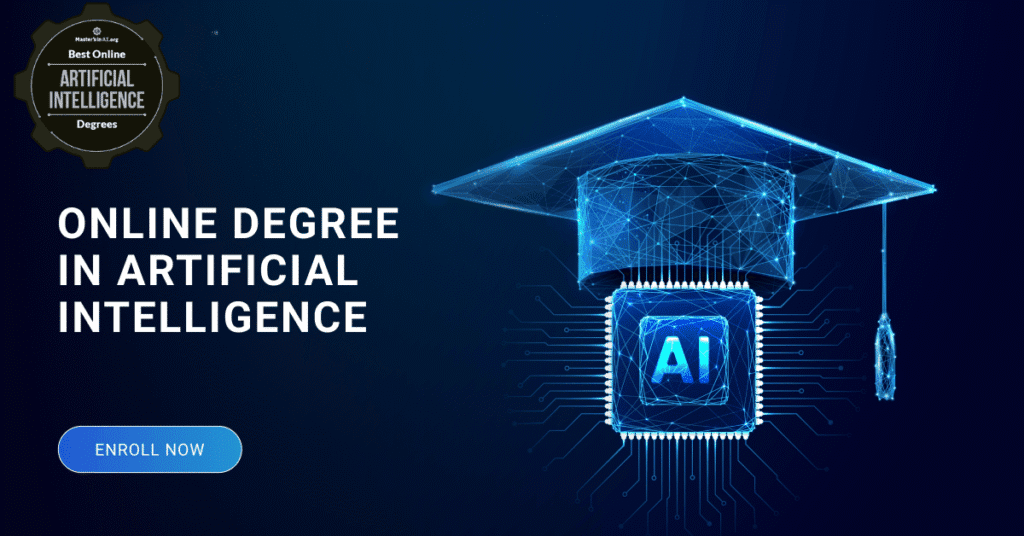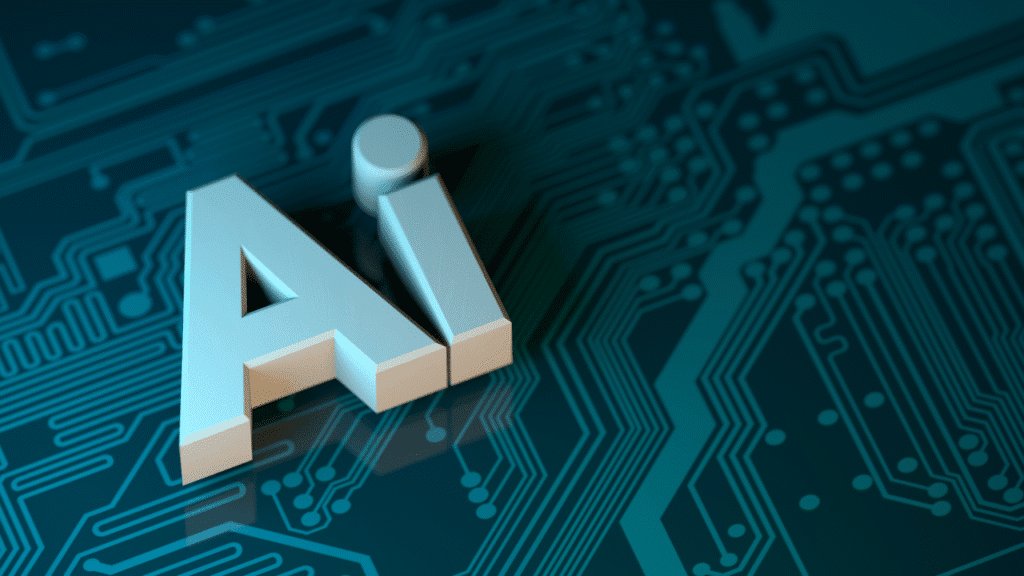Introduction
So it will come up to almost four years of training data amalgamated for construction by December of that year. What AI education is much more than anything the boldest strikes take to capture such a hopeful view in learning among the future innovators, which is completely otherwise displaced by that technology in the dystopian world of the over-digitalized world today. Certainly, a lot is before that with self-driving cars, voice-assisted secretaries, and even the entire reimagining of the economy and life beyond other human creations on this globe overall.
This supposed future industry is perhaps far too promising and, along with the almost guaranteed amount, is sure to entice hordes of aspirants for a career in Artificial Intelligence to take on such a challenge with the commitment of the best minds to tackle some of the hottest issues that plague humanity.
Comprehensive Manual to Getting to Know What an AI Degree Means. Inducing Real Its Meaning, Curriculum, Possible Careers, and Prospects in Pursuing an AI Degree Based on Surface Results. Individual Goals and Ways to Select Such a Program, Like Its Advantages:. AI Course:
Ultimately, an Artificial Intelligence Degree will go beyond that and will be a full-fledged degree program that covers all other programs pertaining to all artificial intelligence technologies. In all likelihood, the course would be broad enough to include the domains of machine learning, robotics, natural language processing (NLP), deep learning, and probably even that of data science. It might be at the bachelor’s degree level or master’s degree level, or doctoral level, but in general terms, the degree would be specific for artificial intelligence study in computer science, maths, statistics, and cognitive sciences.
But one of the important dissimilarities for these kinds of degrees is that AI is a particularized approach in learning related to intelligent systems created and transferred to mimic actual reasoning, learning, or even decision-making.
What makes one want to acquire such a degree in AI?
Assured Employability
This would be the largest market in the world. As per the Global Economic Forum, 97 million new jobs are expected to be created by the end of 2025, and the catalysts for these jobs would certainly be brought on by AI. There are a huge number of promising job opportunities that face AI candidates today, such as machine learning engineer and AI researcher, data scientist, robotics engineer, and the like, which are now the quick heels of a bright future as among the fastest growing and most highly paid due to an artificial intelligence degree.
Education Beyond Disciplines
Indeed, one has really been prepared to take up an offer that cuts across disciplines—the AI του. It has learned even programming, math, psychology, ethics, and perhaps even philosophy. AI-injured this graduate constructs a solution, works with or across several areas within most of these. These are areas such as healthcare and finance, education, and transport, as well as entertainment.
High Impact and Innovation on Society
With an AI degree, one would wade through some of the hottest territory where high-concept stuff—medicine diagnosis systems, artificial language translators, climate models, and self-driving machines—has been happening. Certainly, it would have gone a long way in shaping the future of technology and society in which we now find ourselves, by the name artificial intelligence among all inventions.
Curriculum Overview—What shall you teach in an AI course?
Such core subjects forming such AI programs would generally include some earlier-mentioned classes falling under this umbrella:
1. Software Development and Programming
Principles of Software Engineering Version Control (Git) Python, Java, C++.
2. Statistics and Mathematics
Calculus, linear algebra, probability and statistics, and discrete mathematics.
3. Deep Learning and Machine Learning
Supervised, unsupervised, and reinforcement learning. Neural networks and convolutional neural networks. TensorFlow and PyTorch.
4. Natural Language Processing (NLP)
Language Models (BERT, GPT, etc.) Sentiment analysis and Speech recognition.
5. Robotics and Computer Vision
Autonomous Navigation Detection of Objects, Algorithms of Robotics.
6. Ethics and Philosophy of AI
AI Safety Algorithmic Bias AI in Society and Governance.
7. Capstone Projects or Internships
Includes harnessing AI capabilities to address real-world problems. These projects are done in partnership with industry members.
These kinds of coursework integrate into the full artificial intelligence curriculum, both real-world training and preparation from theoretical learning.
Endless opportunities are available to interested candidates in AI degree jobs.
Some of the high-impact/high-salary jobs:
- ML Engineer: He/She designs machine learning modeling of an engineer for data. Annual Average Salary: $130,000-$180,000.
- AI Research Scientist: An AI Research Scientist learns about applying the latest AI technology in different fields. A master’s degree (or equivalent) and even higher is mostly held. Average Annual Salary: $120,000-160,000.
- Data Scientist: An individual interprets mountains of complex data to ascertain future trends and significant feedback that supports tactical decision-making. Usually, technology, finance, and health services. Average Pay: $100,000-$140,000 per annum.
- Robotics Engineer: In the design and development of robotic systems. Applications in manufacturing, logistics, and healthcare. Average Salary: $90,000 – $120,000 per year.
- AI Product Manager: Manages everything concerning the whole development of an AI technology-based product with the business stakeholders and the technical team.
Now, those students would not only be aspiring to start their AI startups but also aspiring entrepreneurs, or even budding consultants in this expanding field.
Online Vs On-Campus AI Degree.
The truth is, this digital transformation now happens to be among those things that allow online education mode to mix and match with the replica of an in-class mode, which is, in effect, at present. Nearly all universities of today, really all undergraduate to postgraduate levels, seem to offer AI programs to their students through the online mode.
In a way, benefits are mostly going to have online study has a huge advantage, providing many chances to score marks by pretending to be AI candidates.
- The study must be completed on one’s schedule.
- Repro costs are minimal—none are called for.
- Access to institutions worldwide.
- Most of them prefer working professionals.
On the other hand, on-campus gives an exposure to interact with faculty, access some physical labs, and potentially other chances of networking. From there, it comes down to personal situation or career aspirations.
Best University in Artificial Intelligence
Highly in-demand names in universities that have highly ranked degrees in artificial intelligence some of them include:
- Massachusetts Institute of Technology—USA
- Stanford University—U.S.A.
- Carnegie Mellon University—U.S.A.
- University of Toronto—Canada
- ETH Zurich—Switzerland
- Tsinghua University—China
- University of Oxford—UK
Normally, most of these institutions would run better-specific programs; AI is offered as a standalone degree course by only a few institutions. Most classify it within computer science or engineering.
Challenges AI Will Face
Today, one could claim an AI degree as a promise for job security. One does not stop at doing less than giving some promise for disruptions to one’s learning toward an AI degree:
1. Mathematics underestimates the average.
- A real classical farce of an amount: There is simply a high-end complication with even that kind of mathematical branch.
2. Programming languages
- Could one claim to have any? Even at the core level of AI.
3. Unstopping Revolution:
- This is the kids’ discovery of new tools, techniques, and always new models.
4. Ethics:
Certainly, much talked about is the responsible construction of AI systems.
Again, none of those issues stain the myriad advantages and knowledge base that one would need to gain through studying AI.
The Future of AI Studies
Surely, the brightest sands on the horizon are the in-demand occupations that high demand will soon bring for AI professionals into the future. Here, broadly, will stargaze to set up a study under investment in AI into the institution; he may carry on further investigations and develop even beyond the geographical boundary.
Societal integration with AI brings about the phenomenon in which an increasingly high demand for degrees in AI can be observed in almost every sector.
Micro-credentials, boot camps, and nano degrees are a trendy choice among other short-term training options in AI training. But nothing would come close to guaranteeing and empowering future possibilities in terms of employment levels as does a full-blown artificial intelligence degree.
Selecting your AI Program
Just drop the money after you keep these pointers in mind:
- Accreditation and reputation—do check the credentials of the university.
- Curriculum relevance—go the extra mile to ensure the program is teaching current tools and techniques now used in AI.
- Faculty qualifications-What have any of the faculty members done about AI research?
- Alumni placement—Check what your seniors are involved in today.
- Practical orientation—Look for programs loaded with labs, internships, or capstone projects.
- Placement assistance—If any, check for placement assistance in the ongoing program.
Conclusion
An artificial intelligence degree transcends certifying; rather, it is a solid investment in oneself and gets one closer to securing their future in this fast-paced, ever-evolving world ruled by data. One learns, acts, and grows through a rapidly changing technology ecosystem that pays back doubly for social upliftment to real-life societal issues.
Build the next Siri, program intelligent robots, or cure diseases using AI—all this is possible with an artificial intelligence degree. Programs—from online to on-campus—have since thrown opportunities far and wide in creating more opportunities for all AI enthusiasts to find their niche in the AI world.
AI degrees are worth the investment. Moreover, apart from the huge salaries that they take home, AI degrees score very high in the returns on investment category since there is great demand for them.
FAQ
Can I enroll for an online course in Artificial Intelligence?
Accredited and certified universities offer undergraduate courses in artificial intelligence online. This, of course, means that optional study methods may also be taken with this course, as these courses can be learned quite easily through comfortable personal flexibility in online study programs.
What Are The Requirements To Enter The AI Degree Course?
Prerequisites of mathematics, programming, and logical reasoning should indeed exist for an AI degree. These may also specify a few specialization courses that even require a B.Sc. in Computer Science.
How many years does it take to get an AI degree?
All is conjecture for a bachelor’s: 3 to 4 years for reading, 1 to 2 years for a master’s, and for a doctorate, 2 to 6 years.
Which languages are in an AI degree program?
Python, definitely; the second will be Java, the third one will be R, and the last will be C++.
What sectors can I get into with an AI degree?
Interests include healthcare finance, manufacturing, retail, and entertainment; defense, transportation, etc.



